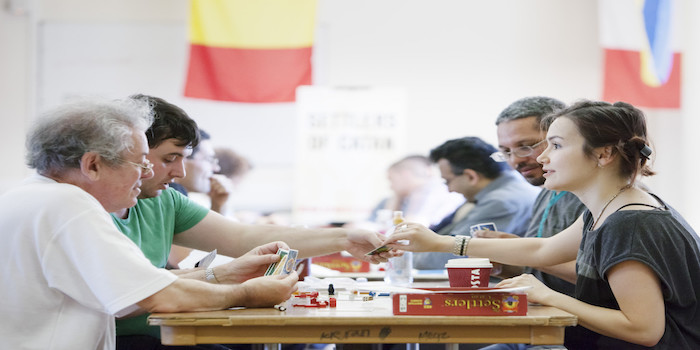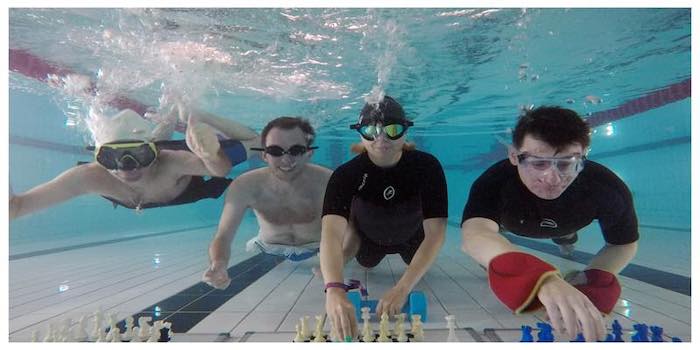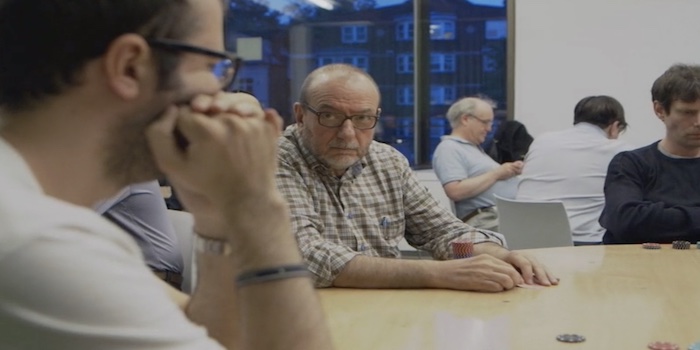
The Mind Sports Olympiad (MSO) is an annual event for mental skills and mind sports. MSO gathers board and card game enthusiasts from all over the world, and curiously software developers and programmers dominate the event. Some of the Olympiads are currently some of the world’s groundbreaking developers.
MSO began in 1997 in London and continues to be hosted there under the tutelage of Etan Ilfeld, an entrepreneur and business owner who manages the event. In this exclusive interview with Etan, we discuss more about this competition that features 6 poker variants and the unique sport of diving chess.
The Mind Sports Olympiad
How did you come up with the idea of creating a Mind Sports Olympiad? Was there any special motivation?
The Mind Sports Olympiad (MSO) was the brainchild of Tony Buzan (inventor of mind maps), David Levy (chess master and Artificial Intelligence researcher) and Raymond Keene (Chess Grandmaster). The first competition was in 1997. I first competed in 2008 and volunteered to organize the event in 2010. I’ve been the chief organizer for 9 events so far and hope to do many more.”
Are there other events like this that you know of around the world?
“There are lots of different tournaments, but MSO is unique in that it also has a meta event called the Pentamind that lets you take your top 5 scores from any 5 events to discover who is the best player overall. There is nothing quite like the Pentamind World Championship anywhere else.”
How can someone register or be considered to participate in the event? Is it open to all types of players around the world or is there a set of minimal requirements like age, location, existing minimal skill record etc.?
“Anyone can participate and all ages are welcome. Registration opens in the spring and anyone can register on a first come first serve basis until we reach capacity for each event. The tournament is also in the second half of August in London. To stay up to date, I suggest signing up for our newsletter.
On the website, we can see chess is being played in a pool. Is this a variation of the game or just an interesting extra challenge for the players?
“I invented Diving Chess as a way to combine sport with a rigorous mental challenge. This chess variant is played such that each player can only think for as long as they can hold their breath for each move. It is both physically and mentally taxing.

How cold was that pool?
The pool is quite warm (around 20 Celsius = 68 Fahrenheit) but it still gets cold after playing for a few hours, players tend to do laps to warm up the circulation between games.”
60 games! That means how many competitors in total and per game for the past edition?
“Most events have between 20 to 50 players and the total number of entries for the entire 2018 event had 1,455 entries.”
Reviewing the winners and the fact that there is a Computer Programming Championship makes me think these games attract programmers and coders the most. In your opinion, what makes programmers so attracted and skillful at these games?
“Programmers are extremely analytical and logical. A true champion has to know how to keep their cool under pressure and always optimize their gameplay, which programmers seem to do very well.”
What other professional backgrounds have the best match for mind games, taking into account those who have participated in the event? (I see neuro-scientists, economics, video game developers, AI developers, mathematicians, etc.)
“Some of our top players play poker professionally. While we have a lot of players who are very analytical, the most important attributes are a love for playing games and a competitive nature.”
What games are most recommended for programmers or others to play and enhance their problem-solving skills?
“I highly recommend Quoridor, Lines of Action, Entropy, Chess, and Backgammon.”
Do you consider that mind games can actually enhance certain skills of a person that can be applied at a professional level?
“Absolutely. This has been demonstrated by many of our successful champions who have translated their success to other fields ranging from AI to finance. One of the biggest examples is Demis Hassabis who sold his company DeepMind to Google.”
What is your all-time favorite game?
“Chess is still my favorite game, and I love playing lots of different chess variants. At the Mind Sports Olympiad, we have Chess960, Exchange Chess (aka Bughouse), Diving Chess, Chess Problem Solving, blitz and rapid, and now a new variant called colored chess.”
In past editions, the event was held in what is now the Student Central, London. Have universities shown interest in the event and are active participants with well-established teams, or is the event still amateur in nature where individuals reach out by their own means?
“We have lots of university students but also competitors of all ages. While there is no team per se, we have several foreign groups that travel as a sort of team to compete and do very well on an individual level. These include junior players from Spain and South Korea and groups of adult players from Estonia and Italy.”
What is your vision with this event, short-term goals, and future dreams of what it might become?
“We are currently producing a documentary about the Pentamind, which we hope to have as many people view as possible so as to raise awareness. While the event has been growing since I took over in 2010, it is still smaller than it was at its heyday in 2000 when it had over 3000 entries. I would like to see us surpass the 2000 event in the next few years. We also experimented with live streaming for the first time this year and plan on continuing to do so next year.”
Wild thought, has there ever been thoughts of discussing the event with the Sports Olympics Committee so we have mind games recognized as official sports?
“That’s a challenging political exercise as many mind sports have tried to be recognized as actual sports but have had little success. While one could make the argument easily for Diving Chess, it’s hard to see the general public considering games like chess and backgammon as a sport.”
What is the main prize for the Pentamind World Champion?
- £500 for 1st place
- £150 for 2nd place
- £75 for 3rd place
£75 will be awarded to the Women/Senior/Junior’s Pentamind World Champion.
What is the individual prize for each game-winner? Why don’t all games have prize money?
“All events have medals for juniors and adults (who play together). We’ve learned over the years that cash prizes are important for games that have professional players in order to attract the top talent (e.g. Go, Scrabble and Chess) so that’s what we focus on. We currently don’t give cash to games such as backgammon that are considering to be a form of gambling due to licensing restrictions and the fact that our events are open to juniors to participate.”
About Poker in the Mind Sports Olympiad
Tell us a bit more about the Poker Hold’em competition, what are the basics?
“The pot-limit Texas hold ’em is one of our most popular events and is basically a knock-out tournament that lasts about 8 hours.”
Which poker variants can be played in the event?
“London Lowball, Hold’em (pot limit and head’s up), Omaha, 5 Card Draw, Pineapple, and 7 Card Stud.”

Are players for poker amateurs or do some professionals participate?
“Some of our top players are professionals, but most are amateurs.”
What specific skills does a poker player need to master the game?
“A poker face is vital as you should never give information away (while trying to read out opponents). You should know the basic probabilities and how to calculate them. One of our champions, Dario De Toffoli, wrote a great book on poker that I recommend: The Big Book of Poker
Why isn’t blackjack included in the competition since it is considered one of the card games that involve the most mind skill in terms of memory and math? Card counting might be banned from casinos, but it makes perfect sense in completion like this.
“Blackjack is a great game but it’s not usually played between competitors but rather against a dealer, which doesn’t quite fit into our format. I can assure you that some of our Mental Calculation World Champions can easily count cards.”
Mind Sports Olympiad 2019 Recap
Overall, the Mind Sports Olympiad has worked long and hard to get to an event of such proportions as it is nowadays. The organization aspect falls into the skillful hands of Etan Ilfeld, seeing the event grow and expand. The Mind Sports Olympiad 2019 had players experience nearly half a dozen new takes on the game of chess, as well as other classics such as Scrabble and Go.
This year, the winning title went to last year’s champion, Ankush Khandelwal. Taking the gold medal on behalf of his homeland Britain, Khandelwal was officially declared the winner for the third time.
The event also managed to find its place among the more innovative gameplay options – 7 Wonders, Dominion, Magic the Gathering, and Settlers of Catan. Although it had fewer participants than the last two years at the only Mental Calculations World Championship, the Mind Sports Olympiad ended on a promising note.




